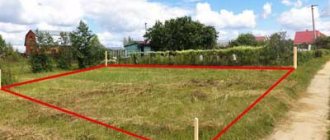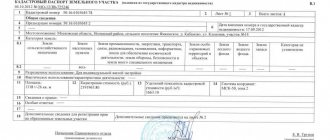If you own a plot of land, then any building can be built on its territory, of course, with all the necessary approvals. How a house is registered as a property by the owner of a land plot, what legal acts regulate this process and what documents will be needed in this case, this article will be devoted to the answers to these and other questions.
Standard property registration scheme
- This is possible if the owner has the necessary documents ready and updating the existing data is not yet required. You must have a passport, confirmation of the right to a land plot (contracts of donation, purchase/sale, lease, documents on the right of inheritance, court decisions, etc.), a cadastral passport of the plot. A receipt confirming that the citizen has paid the state duty is also attached here.
- The next step is that the owner must write an application to Rosreestr. It includes a request for registration, information about a plot of land of a cadastral and boundary nature, and passport data of an individual.
- Rosreestr issues confirmation that the documents have been accepted and reviews them within 7-9 days. If there are no discrepancies in the documents (for example, between rights that arose earlier), a corresponding note is made in the Unified State Register of Real Estate.
EGRN is the primary owner of property information
Important! You can also register ownership as private in a multifunctional center. The registration operation here is absolutely identical to that which occurs in Rosreestr, and the data received by these organizations replenishes the unified information bank. In addition to personal contact, citizens can use the services of regular or e-mail.
Upon completion of all aspects related to the registration of property rights, the citizen receives a corresponding certificate of ownership.
Secret 3. Is it possible to live here?
Another section of the Unified State Register that you need to pay close attention to is an indication of the category and permitted use of the land on which the site is located. It is possible to build a full-fledged residential building or cottage only on a plot of land classified as “land of settlements” with the permitted use of “individual housing construction” (IHC) or “personal subsidiary plot” (LPH). A garden house is being built on agricultural land with permitted use - “dacha construction”.
According to the decision of the Constitutional Court dated June 30, 2011 N 13-P, you can obtain permanent registration in a country house. In addition, there is currently a bill in the State Duma (passed in the first reading) that also provides for the possibility of registering citizens in garden houses.
If the subject of the transaction is a plot with existing buildings, the buyer should make sure that the capital structures are registered in the State Register, have technical passports, as well as a documented connection of utility networks. If gas/electricity has not yet been supplied to the house, you should make sure that the wiring of communications has been agreed upon with the energy sales and gas supply organization. It is quite risky to acquire land without agreed conditions for supplying utility networks. In the practice of Ekaterinburg realtors, there was a case when laying a gas pipeline to three new cottages cost an amount exceeding the cost of the houses themselves and the land plots on which they are located.
How to pay state duty
The cost of the state duty varies depending on who pays it - an individual or a legal entity (hereinafter referred to as f/l and y/l), and the intended purpose of the allotment affects the price of the issue.
Minimum costs - 100 rubles - are expected for f/l and y/l, registering shares in common agricultural property.
350 rubles , whether an organization or an individual, will be spent when registering agricultural plots. For the same amount, land is registered for personal farming, building a garage, and planting a vegetable garden.
The price increases significantly for land plots with a house or a plot for individual housing construction: 2 thousand rubles for a f/l and 22 thousand rubles for a y/l.
If you pay electronically, it will be cheaper
The extract from the Unified State Register of Real Estate combines information from the Unified State Register of Rights Registration and the cadastral passport - it will cost 750 for a f/l and 2,200 rubles for a f/l if it is made on paper. In electronic form it is cheaper: 250 rubles f/l and 700 rubles u/l. An extract from the Unified State Register is necessary, as it makes it possible to obtain information about the real estate being registered before concluding a transaction to transfer the right to private ownership of land.
Required package of documents
According to Art.
39.15 of the RF Land Code, you should initially obtain consent for the provision of a site from the body involved in the coordination of these issues in a particular region. To do this, the owner of the house or several submits an application.
In your appeal you should refer to paragraphs. 6, paragraph 2, art. 39.3 of the Land Code of the Russian Federation, which gives priority rights to the owners of a house located on the requested site.
Next, the property owner must prepare the following package of documents in originals and copies:
- passports of the owners of the house, if among them there are minor children under 14 years of age, a birth certificate is needed;
- title and title documents for the house, for example, an extract from the Unified State Register of Real Estate;
- a list of existing buildings on the site - residential and commercial, including unregistered ones;
- land layout diagram, cadastral plan. Art. 11.10 of the RF Land Code gives the right to independently draw up a diagram, if you have the appropriate knowledge;
- If a representative is involved in the registration, you need a power of attorney certified by a notary.
Register an allotment for only 350 rubles
It is possible to do without extra costs, but this only applies to a rather narrow range of cases. A common option that citizens apply to when registering land ownership, when there is a certificate of the right to lifelong inheritable and permanent ownership of land (PNV). It is not enough to complete a purchase and sale transaction. It is necessary to register ownership according to the new laws.
Registration of land ownership is not always expensive
The big advantage of this case is that land surveying is not necessary here, and, consequently, costs are significantly reduced: the approximate cost of the necessary land surveying work ranges on average from 10 to 30 thousand rubles . Therefore, the question of how much it costs to register a plot of land will not frighten the owner with large numbers.
See also: Catalog of the most popular plots in the Moscow region intended for the construction of suburban real estate.
If the plot is inherited
Registration of inherited land costs 0.3% of the price of the plot - this applies to immediate relatives and 0.6% - for other persons. The notary issues a certificate of private ownership. The work of a notary will cost 5 thousand rubles . The declared amount will increase if the right to inheritance has to be defended in court.
It should be remembered that the object is recognized as real estate, and therefore it is necessary to register the allotment. To do this, you need to submit an application for state registration and provide a certificate received from a notary in addition to the standard list of documents. The state duty will be 350 rubles , for shared ownership - 100 rubles . State registration takes place within ten working days. Only after this the heir has the right of ownership to the acquired area.
State registration is one of the last stages
The land was received under a gift agreement
As in previous options, ownership of the donated plot arises when the title to the land is registered with the state registration service. There is no need to register the contract itself and pay a state fee for it. Rosreestr registers the submitted documents, finds out whether the transaction is legal, and conducts a legal examination. The papers are assessed for the presence of contradictions between the rights to the object that already exist and those newly declared. When the owner receives a state registration certificate, it is difficult to challenge his rights; this is only possible by going to court.
The recipient is required to pay tax on the property received. It includes 13% of the cost of the plot if you are a resident of the state and 30% when you are not. The donor's immediate family is not required to pay tax. The owner, having received the plot, in order to avoid a fine of 1 thousand rubles , must submit a 3-NDFL declaration, indicating the cost of the plot.
The donation must also be formalized in accordance with the law.
Is it necessary to carry out the procedure: pros and cons
Privatization of land under a house has its pros and cons.
The advantages include:
- The ability to carry out any operations with the site, for example, to sell or carry out commercial activities.
- Land can be bequeathed or donated.
- The owner has the right to rent out the plot.
The disadvantages of privatization include the fact that:
- There is an obligation to pay land tax.
- The owner will also have to maintain the site in proper condition.
Almost every owner, including residents of apartment buildings, can privatize a plot of land for their own house. To do this, you need to prepare a number of mandatory documents and contact the authorized authority. The procedure will entail certain costs associated with paperwork and payment of state fees.
Buying or selling a plot
Ownership rights may arise as a result of a purchase and sale transaction and the execution of a corresponding agreement. Such an agreement, according to current legislation, must be registered. You can resort to the services of a notary, and he will assure that the transaction was carried out legally, or contact Rosreestr or the MFC. Registration of the agreement in the Unified State Register of Real Estate makes it possible to use the land and make transactions with it. Registration of the contract and the right to property (do not confuse these concepts) can be completed online on the Rosreestr website or through the State Services portal.
The Tax Code, Art. 33: the fee will be 2 thousand rubles if no buildings were erected on the site; Registration of land with a house is estimated twice as much.
It is possible to register the right to land during purchase and sale by preparing an extended package of documents. To the usual set (passport, cadastral and survey documentation), an excerpt from the Unified State Register from the seller, powers of attorney from the seller and buyer, pre-certified, a certificate of ownership, the consent of the owners to sell the share and the consent of the spouse, a purchase and sale agreement (will be required) is added 3 copies), application for state registration, transfer document under the contract, payment of state duty certified by a receipt.
Each document is made in the required number of copies
Until what year was it extended?
Previously, the deadline for the privatization of private real estate, including land plots, was extended several times, so the question remains up to what year the deadlines have been extended now. Currently, according to the rules of paragraph 3 of Article 3 of the Federal Law of October 25, 2001 No. 137-FZ, it is determined that the period for registering land plots is unlimited.
This rule applies to territories granted for permanent use, lifelong inheritable possession and lease.
Leased plot
While the plot planned for registration as private property, in accordance with the new legislation, appears as being leased, transactions are not available for the leaseholder, because the plot officially belongs to the municipality. To register a plot as personal property, an application is written to the local municipality, and cadastral documents must be ready, payment for the purchase of the plot and state duty must be paid.
Important! Poor citizens have the right not to pay for the redemption of land.
It is possible to register ownership of leased lands if there is privatized property on them, the site was used for agricultural work or for its intended purpose.
How necessary is this?
Let's consider whether it is necessary to privatize a plot if a house is built on it.
Reference! The legislation does not force the privatization of the land on which a residential building is located. The procedure is voluntary and it has its positive and negative sides.
The advantages are how you can manage the land if it has been privatized and is already owned:
- carry out transactions, give gifts, leave inheritances;
- the owner erects useful extensions on it at his own discretion;
- investors cannot occupy the territory adjacent to the house.
The disadvantage will be the annual assessment of property tax , the amount of which depends on the cadastral value. For many, paying this amount has a negative impact on the budget.
Legalize a plot in SNT
The law on dacha amnesty, which appeared in 2006, and the articles of the Land Code of the Russian Federation, in force since 2015, significantly facilitate the process of registering territories for dacha ownership.
Thanks to the simplified system, ownership of land in gardening partnerships is transferred to individuals free of charge. The land at the dacha can be privatized or, under certain conditions - indefinite use, lifelong inheritance, lease agreement - purchased.
The dacha amnesty has simplified life for many
Plots that are not officially registered by the owner at a certain time and properly may pass to the state. Registration of a cadastral passport and paid state duty allow you to carry out activities for state registration of rights to a land plot. The limitation is this: the land must be assigned to the cooperative no later than October 30, 2001, and the dacha plot must be free of encumbrances. Of course, you will need papers that can confirm the right to property.
When is free delivery possible?
Article 39.5 of the Land Code of the Russian Federation allows the privatization of a land plot free of charge in the following cases:
- The plot is provided to a family raising three or more minor children.
- The territory was leased for construction and or farming more than 5 years ago.
- The plot was obtained in a rural area under the terms of compulsory employment in a socially significant profession more than 5 years ago.
- Land users are persons who have benefits. These include the poor, combat veterans, and disabled people; heroes of Russia and the USSR.
Important! The last category of persons receives the opportunity to privatize a plot free of charge only on the condition that they do not have the opportunity to exercise this right on an equal basis with others.
Refusal to privatize will take place in the cases specified in paragraph 8 of Article 28 of Federal Law No. 178 of December 21, 2001.
This rule applies to areas included in the land:
- specially protected objects and natural areas;
- water and forest resources;
- contaminated with hazardous substances and subjected to biogenic contamination;
- public areas – squares, streets, driveways, highways, embankments, parks, forest parks, public gardens, gardens, boulevards, water bodies, beaches and other objects;
- reserved for government needs;
- intended to support activities in sea and river ports, airports or allocated for their development.
The specified list of grounds for refusal is exhaustive. More information about which categories of land are not subject to privatization can be found here.
Is it possible to privatize a land plot if private housing is owned?
If the owner of the house has registered ownership of it, he can privatize the plot under it. Restrictions regarding the number of participations in privatization in relation to an object. If a person has not privatized a plot of land earlier, he can do so after registering ownership of the house (how do you know if the land has been privatized?).
Attention! The exception is minor participants in privatization. They have the right to register ownership of the plot again upon reaching eighteen years of age.
Find out more information on how to transfer rights to land into private ownership, if the house is privatized but the land under it is not, in a separate article.
If there are several owners
If the house belongs to several persons on the basis of shared ownership, then for privatization it will be necessary to determine the boundaries of the plot of each of them. It is necessary to produce a cadastral passport for each part. The plot must be divided equally among all owners. Each individual will privatize their share.
Under the MKD
Residents of an apartment building have the right to privatize the plot on which the property is located. To do this, it is necessary to hold a general meeting and formalize the decision in minutes. Privatization of a plot for an apartment building allows you to:
- construction of sports and children's playgrounds, recreation areas, garages for the disabled and veterans;
- landscaping;
- creation of parking lots;
- renting out the existing parking lot.
We talked in more detail about the privatization of a land plot for an apartment building here.
If you need to register the land under the house
In this situation, until the house and the plot itself are privatized, the property is considered illegally used, and transactions with it are impossible. When there are cadastral documents for a house, the owners may mistakenly believe that this is enough and do not care about registering the land directly under the house, but it is an integral part of the residential building (apartment). In order to have a cadastral number and a passport for the land, it is necessary to organize geodetic work, which includes topographic survey, measurement with land surveying, as well as clarification of the boundaries with neighbors' plots.
Based on these data, the private individual receives a technical extract, takes the documents to the cadastral organization, and attaches as confirmation a receipt confirming that the state duty has been paid. As a result, a certificate is issued confirming the owner’s right.
Certificate of Title Cap
Fence of the local area of a private house
We can use the land, build houses and other structures on it only if we comply with urban planning norms and rules. There are legal requirements for the number of storeys of individual houses on a site, for their maximum size, there are standards regarding the location of buildings relative to the fence, requirements for the type and height of fences, and for planting plants along the perimeter. In addition to following the rules within their own area, each owner is responsible for the area adjacent to the fence.
Land acquired by squatting
When there are no papers for real estate, such an allotment is classified as obtained by self-capture. Any actions in such territories are illegal and subject to administrative liability. But there are ways that will help legalize these lands, making them private property.
A private individual needs to complete a purchase and sale transaction. When the land belongs to SNT or municipal authorities, it is necessary to submit an application to purchase the property. In circumstances in which the plot is the property of the state, it can be put up for auction (previously, the citizen contacts the authorized organization with a message about the desire to obtain the land into private ownership).
Purchasing at an auction makes it possible to register the ownership of land according to the scheme already discussed.
Grounds and procedure for alienation of privately owned land
The right to own a land plot may be terminated in the following cases:
- when transferring a land plot to other persons;
- if the owner himself renounces the right of ownership;
- collection of land for debts of the owner;
- the land was not used for its intended purpose;
- when operating a site in violation of the law;
- temporary seizure of land during natural disasters and epidemics in order to protect the interests of citizens;
- taking away a plot in the interests of the state or municipality;
- nationalization of lands;
- confiscation;
- alienation of a plot if, by law, it cannot belong to this person.
In the case where the owner voluntarily renounces the land, he must draw up the relevant documents with a notary. The owner also has the right to donate, sell, and bequeath his property.
If a decision is made to confiscate land, it is taken free of charge by court decision. But such alienation is used as a punishment for serious crimes.
When a plot is temporarily withdrawn, its owner is given a corresponding document and the amount of the possible loss is paid, and when the circumstances on the basis of which the land was taken end, the owner can get it back.
When a plot is taken in the interests of the state or municipality, the owner is notified in writing about it a year before the event, the cost of the plot is paid, or an equivalent one is provided elsewhere.
If the land is taken for debts, then you need to obtain a corresponding court decision, make an inventory and evaluate the site. Then it is sold at auction, the debt obligations are paid off, and the difference is given to the owner.
A plot of land can be taken away if it was used for other purposes or in violation of the law. In this case, the owner must be notified in writing of such a decision. If he agrees with him, then the land is sold at auction. Otherwise, you need to go to court.
When alienating a plot, if it cannot belong to this person, then such a decision is made by the court.
Nationalization can be carried out in two ways: as a gratuitous seizure or a full or partial redemption.
The procedure for inheriting land plots is regulated by the Land and Civil Code. A cadastral plan of the territory can be ordered in various ways. We talked about this in detail here. How to find out if a site has been surveyed? All information is in our article.
Existing restrictions
The state has applied a number of restrictions that do not allow specific territories to be registered as property. These include
- territories of cemeteries and parks;
- lands of state reserves and armed forces;
- nuclear power facilities;
- lands withdrawn from circulation.
You can't build a house everywhere
In what cases can land be privatized and when not?
A land plot can be privatized in the following situations:
- the land has been transferred for indefinite use;
- to legitimize the squatting of the adjacent area;
- the allotment was transferred for free use for a period of up to 6 years, 5 of which have already expired;
- received by will.
Land ownership is not subject to registration:
- of particular value to the state;
- forest zone;
- classified objects;
- water protection zones, etc.
Briefly about the main thing
The law on dacha amnesty, which appeared in 2006, and the articles of the Land Code of the Russian Federation, in force since 2015, significantly facilitate the process of registering territories for dacha ownership. The law on dacha amnesty, which appeared in 2006, and the articles of the Land Code of the Russian Federation, in force since 2015, significantly facilitate the process of registering territories for dacha ownership. The law on dacha amnesty, which appeared in 2006, and the articles of the Land Code of the Russian Federation, in force since 2015, significantly facilitate the process of registering territories for dacha ownership.
| A little more attention! Write in the comments what you think - does such bureaucracy simplify the life of the average citizen or is it done more for the convenience of public services? |
Ratings 0
Read later











